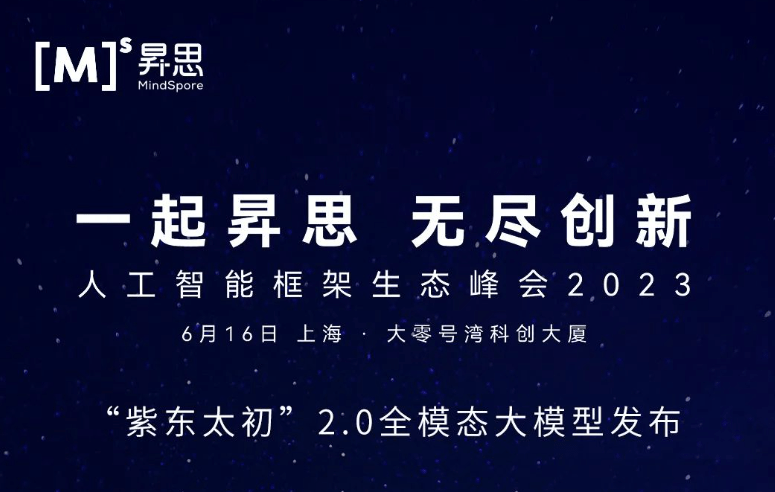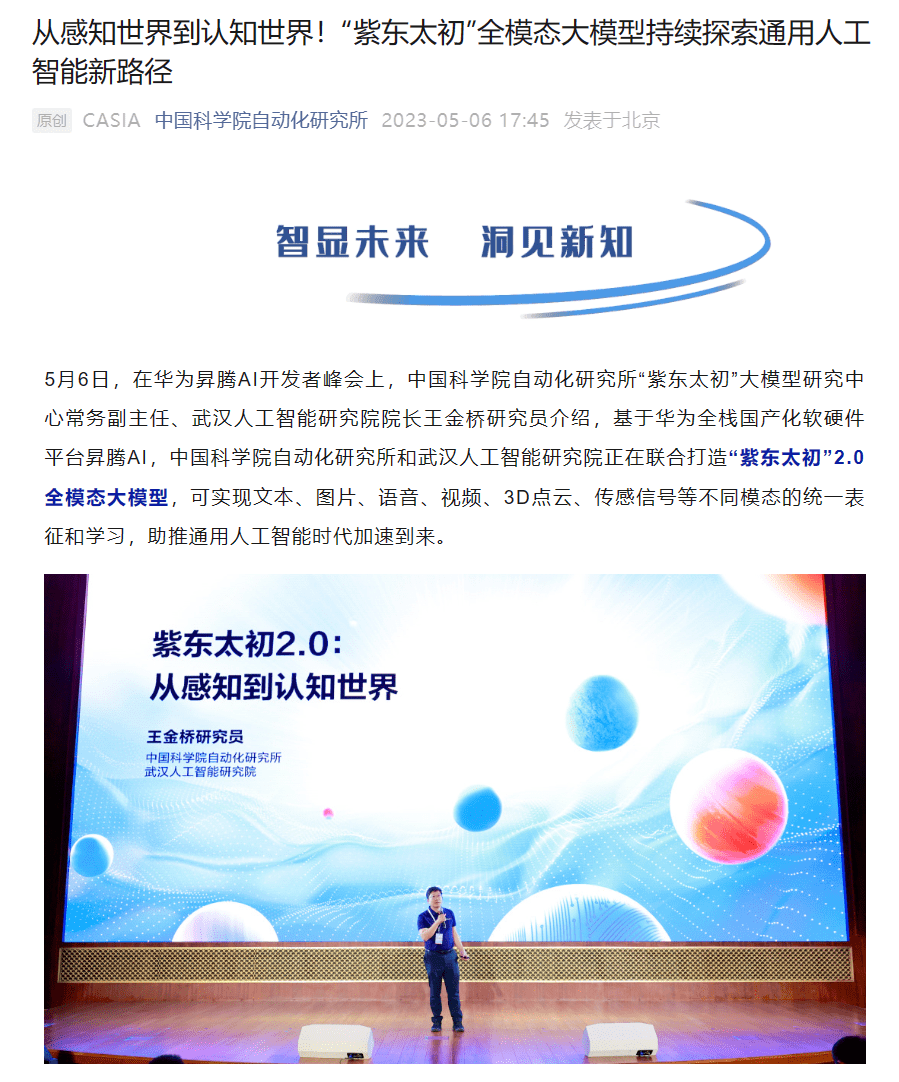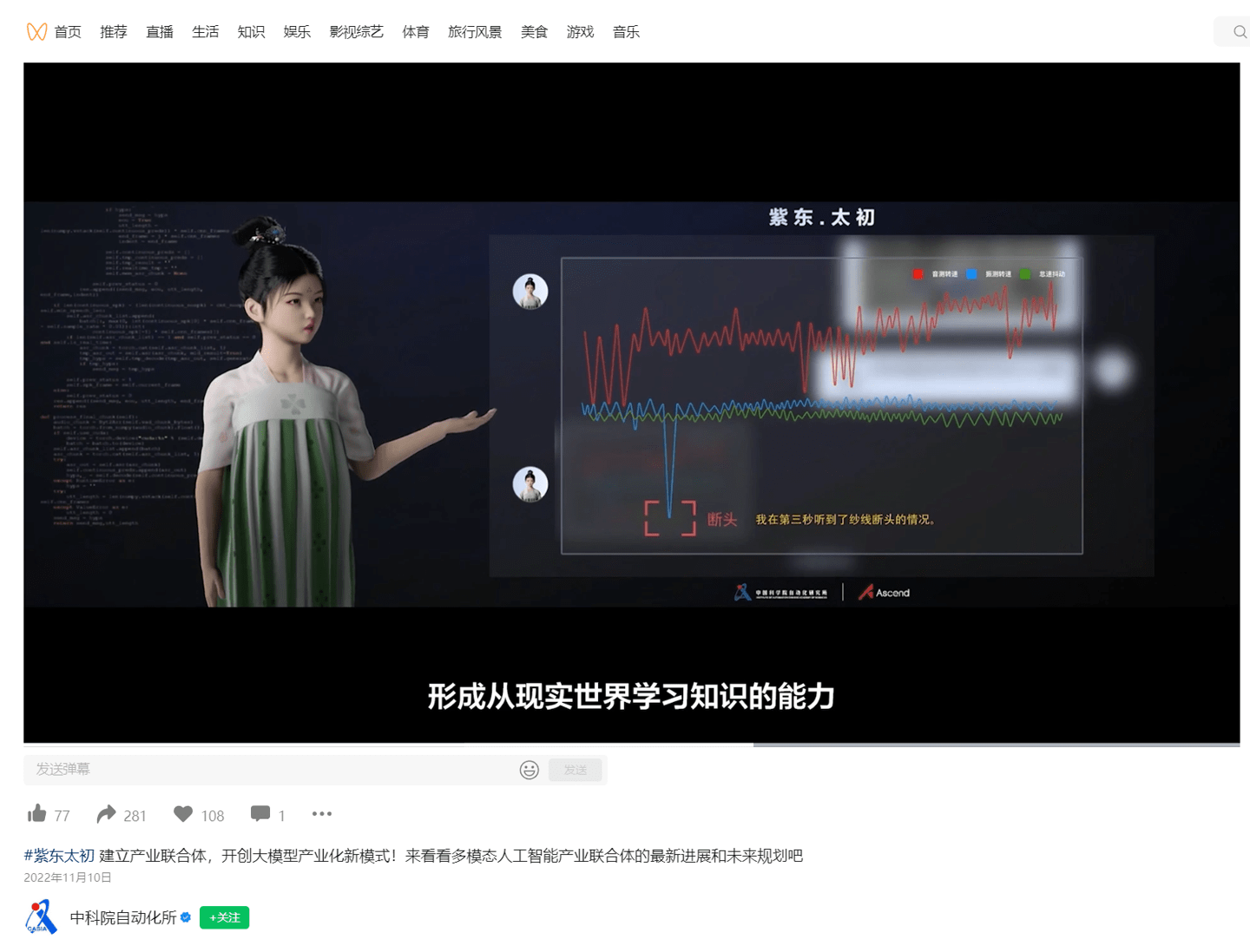 Technology peripherals
Technology peripherals
 AI
AI
 The new generation of AI large model 'Zidong Taichu 2.0' self-developed by the Chinese Academy of Sciences is released
The new generation of AI large model 'Zidong Taichu 2.0' self-developed by the Chinese Academy of Sciences is released
The new generation of AI large model 'Zidong Taichu 2.0' self-developed by the Chinese Academy of Sciences is released
IT Home According to news on June 16, the Institute of Automation of the Chinese Academy of Sciences released a new generation of artificial intelligence large model developed by the institute in Shanghai this morning - Zidong Taichu 2.0.

According to reports, compared with the first generation, the new large model focuses on improving decision-making and judgment capabilities, achieving a leap from perception, cognition to decision-making, and will play a greater role in the fields of medical care, transportation, industrial production and other fields in the future.

According to previous reports by IT House, the first generation AI large model of Zidong Taichu was released in 2021. It was jointly developed by the Institute of Automation of the Chinese Academy of Sciences and Huawei and is known as "the world's first multi-modal large model with 100 billion parameters." .
Different from most of the current large language models that are mainly based on text, the "Zidong Taichu" large model is based on multi-modal technology at the beginning of its development, using more types of data such as pictures, audios and texts to conduct cross-platform analysis. The unified representation and learning of modalities realizes the "unified representation" and "mutual generation" of image, text, and voice data.

According to reports, Zidong Taichu 2.0 is based on Huawei’s full-stack domestic software and hardware platform Shengteng AI and Shengsi MindSpore, and is jointly built by the Institute of Automation of the Chinese Academy of Sciences and the Wuhan Institute of Artificial Intelligence.
Based on text, pictures, and audio, "Zidong Taichu" 2.0 can integrate more modal data such as 3D, video, and sensor signals, and optimize the integrated cognition of voice, video, and text as well as common sense calculations, etc. function to further “break through the interaction barriers of perception, cognition and decision-making”.
The above is the detailed content of The new generation of AI large model 'Zidong Taichu 2.0' self-developed by the Chinese Academy of Sciences is released. For more information, please follow other related articles on the PHP Chinese website!

Hot AI Tools

Undresser.AI Undress
AI-powered app for creating realistic nude photos

AI Clothes Remover
Online AI tool for removing clothes from photos.

Undress AI Tool
Undress images for free

Clothoff.io
AI clothes remover

Video Face Swap
Swap faces in any video effortlessly with our completely free AI face swap tool!

Hot Article

Hot Tools

Notepad++7.3.1
Easy-to-use and free code editor

SublimeText3 Chinese version
Chinese version, very easy to use

Zend Studio 13.0.1
Powerful PHP integrated development environment

Dreamweaver CS6
Visual web development tools

SublimeText3 Mac version
God-level code editing software (SublimeText3)

Hot Topics
 1386
1386
 52
52
 Top 5 GenAI Launches of February 2025: GPT-4.5, Grok-3 & More!
Mar 22, 2025 am 10:58 AM
Top 5 GenAI Launches of February 2025: GPT-4.5, Grok-3 & More!
Mar 22, 2025 am 10:58 AM
February 2025 has been yet another game-changing month for generative AI, bringing us some of the most anticipated model upgrades and groundbreaking new features. From xAI’s Grok 3 and Anthropic’s Claude 3.7 Sonnet, to OpenAI’s G
 How to Use YOLO v12 for Object Detection?
Mar 22, 2025 am 11:07 AM
How to Use YOLO v12 for Object Detection?
Mar 22, 2025 am 11:07 AM
YOLO (You Only Look Once) has been a leading real-time object detection framework, with each iteration improving upon the previous versions. The latest version YOLO v12 introduces advancements that significantly enhance accuracy
 Best AI Art Generators (Free & Paid) for Creative Projects
Apr 02, 2025 pm 06:10 PM
Best AI Art Generators (Free & Paid) for Creative Projects
Apr 02, 2025 pm 06:10 PM
The article reviews top AI art generators, discussing their features, suitability for creative projects, and value. It highlights Midjourney as the best value for professionals and recommends DALL-E 2 for high-quality, customizable art.
 Is ChatGPT 4 O available?
Mar 28, 2025 pm 05:29 PM
Is ChatGPT 4 O available?
Mar 28, 2025 pm 05:29 PM
ChatGPT 4 is currently available and widely used, demonstrating significant improvements in understanding context and generating coherent responses compared to its predecessors like ChatGPT 3.5. Future developments may include more personalized interactions and real-time data processing capabilities, further enhancing its potential for various applications.
 Best AI Chatbots Compared (ChatGPT, Gemini, Claude & More)
Apr 02, 2025 pm 06:09 PM
Best AI Chatbots Compared (ChatGPT, Gemini, Claude & More)
Apr 02, 2025 pm 06:09 PM
The article compares top AI chatbots like ChatGPT, Gemini, and Claude, focusing on their unique features, customization options, and performance in natural language processing and reliability.
 How to Use Mistral OCR for Your Next RAG Model
Mar 21, 2025 am 11:11 AM
How to Use Mistral OCR for Your Next RAG Model
Mar 21, 2025 am 11:11 AM
Mistral OCR: Revolutionizing Retrieval-Augmented Generation with Multimodal Document Understanding Retrieval-Augmented Generation (RAG) systems have significantly advanced AI capabilities, enabling access to vast data stores for more informed respons
 Top AI Writing Assistants to Boost Your Content Creation
Apr 02, 2025 pm 06:11 PM
Top AI Writing Assistants to Boost Your Content Creation
Apr 02, 2025 pm 06:11 PM
The article discusses top AI writing assistants like Grammarly, Jasper, Copy.ai, Writesonic, and Rytr, focusing on their unique features for content creation. It argues that Jasper excels in SEO optimization, while AI tools help maintain tone consist
 Getting Started With Meta Llama 3.2 - Analytics Vidhya
Apr 11, 2025 pm 12:04 PM
Getting Started With Meta Llama 3.2 - Analytics Vidhya
Apr 11, 2025 pm 12:04 PM
Meta's Llama 3.2: A Leap Forward in Multimodal and Mobile AI Meta recently unveiled Llama 3.2, a significant advancement in AI featuring powerful vision capabilities and lightweight text models optimized for mobile devices. Building on the success o



